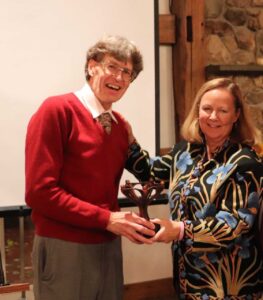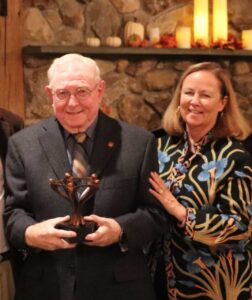Recently, Dave Warren and Jack Dunham received Lifetime Achievement Awards from the Wright Museum of WWII in Wolfeboro for their lengthy contributions as volunteers. Warren has volunteered his time since 2002, while Dunham has been with the museum since 1997.
Both men, noted Mike Culver, executive director of the Wright Museum, have worked in a number of different capacities through the years.
“Each of them have done so much to advance the mission of the museum,” he said. “We felt it was very important to acknowledge their efforts and their impact.”
One of Warren’s biggest accomplishments as volunteer at the museum include his organization of its library.
“I’ve increased the library’s collection by about 3,000 books, many of which I’ve read, and it gave me a new perspective on the war,” said Warren.“I’ve put about 3,500 hours into the library.”
His work in the library, however, represents just a small portion of his work through the years.
“Dave’s contributions have run the gamut from working with school students to presenting programs in our education lecture series and creating some of our most popular permanent displays,” said Culver. “He has also built many of the museum’s WWII ship models and so much more. He is an incredible part of the museum.”
For Dunham, who is 86 years old and volunteers at the museum on a weekly basis, his joy in donating his time stems from his appreciation of WWII’s impact on current American society.
“It helped shape who we are today,” he said.
A veteran of the Koren War, Dunham said his status as a veteran also draws him to the museum, which was founded by fellow Korean War veteran David Wright.
“I remember first meeting him at the museum before the new building was added,” he said. “He was doing some work in the garage and covered with sawdust. We got to talking, and I started ot come around and do some work…I enjoyed it.”
Having help construct some aspects of the museum’s Time Tunnel, Dunham has also worked with visiting school groups. He believes such visits have a profound impact on today’s youth.
“I think kids respond to visuals,” he said. “If something they see here can stick, then I think that is important.”
Warren, who also works with visiting students, said he tries to get them to think about why WWII was an important event in history.
“I want them to think about what they can learn from and how it can be used to face some of our problems today,” he said.
Warren said there is a sense of urgency in such teachable moments.
“Now, kids have very few connections to WWII,” he said. “It seems very remote to them now.”
According to US Department of Veterans Affairs statistics, 496,777 of the 16 million Americans who served in World War II are alive today.
“348 WWII veterans are dying everyday,” said Culver. “With volunteers like Dave and Jack along with dozens of others, the Wright Museum is doing all it can to reach the younger generations to instill in them the importance of WWII and its relevancy to today.”
Unique to traditional WWII museums, the Wright Museum features more than 14,000 items in its collection that are representative of both the home front and battle field. As the region’s leading resource for educators and learners of all ages on World War II, Wright Museum will reopen in May of 2019, although school tours can be arranged from January-April.





